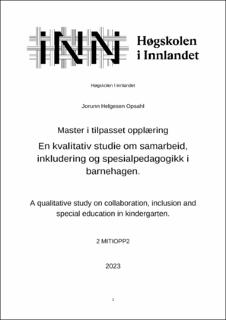| dc.contributor.advisor | | |
| dc.contributor.author | Opsahl, Helgesen, Jorunn | |
| dc.date.accessioned | 2023-11-11T17:10:22Z | |
| dc.date.available | 2023-11-11T17:10:22Z | |
| dc.date.issued | 2023 | |
| dc.identifier | no.inn:inspera:166759702:113023023 | |
| dc.identifier.uri | https://hdl.handle.net/11250/3102014 | |
| dc.description.abstract | Norsk sammendrag
Formålet med denne studien er å få økt innsikt i hvordan pedagogiskleder og spesialpedagog kan samarbeide slik at barn med særskiltebehov får dekket sine rettigheter.
Det er en kvalitativ forskningsprosess som er benyttet i denne oppgaven. Informanter er innhentet med hjelp av e-post intervju fra forskjellige barnehager og kommuner. Ved hjelp av stegvis – deduktiv induktiv metode (SDI), har jeg kommet frem til at det empiriske grunnlaget har blitt til fem kategorier. Kategoriene som ser ut til å fremme samarbeid og inkludering er ansvar, veiledning, tverrfaglig samarbeid, organisering av spesialpedagogiske tiltak og ressurser.
For at alle ansatte i barnehagen skal ta ansvar er det viktig å ha felles mål. Ansatte må få veiledning som fører til ny kunnskap og nye handlingsmåter.
Hvordan den spesialpedagogiske hjelpen er organisert, ser ut til å ha en betydning i forhold til inkludering for barnet og samarbeidet med pedagogisk leder og de øvrig ansatte.
Ressurser er den største faktoren som hemmer samarbeidet. Dette er ressurser som tid og antall ansatte til å gjøre jobben.
Tverrfaglig samarbeid bør være slik at alle blir hørt og anerkjent for den fagkunnskapen man innehar. Den bør bestå av å lytte til hverandre og kommunisere på en hensiktsmessig måte.
Et nydelig sitat fra en av mine informanter om hva som er viktigst i barnehagen: «lekne og rause ansatte som tar ansvar for relasjonen til barnet og er varme i grensesettingen. Trygge og gode rammer for samarbeidet, åpenhet, gjensidig respekt og tillit. Fokus på gode holdninger og verdier ligger til grunn for det meste, også er det viktig med god tilbakemeldingskultur». | |
| dc.description.abstract | A Qualitative study om collaboration, inclusion and special education in kindergarten.
The purpose of this study is to gain increased insight into how educational leaders and special educators can work together so that children with special needs have their rights covered.
A qualitative research process is used in this thesis. Informants were obtained with the help of e-mail interviews from various kindergartens and municipalities. Using the step-by-step – deductive inductive method (SDI), I have concluded that the empirical basis has turned into five categories. The categories that seem to promote cooperation and inclusion are responsibility, guidance, interdisciplinary cooperation, organization of special educational measures and resources.
For all employees in the kindergarten to take responsibility, it is important to have common goals. Employees must receive guidance that leads to new knowledge and new ways of acting.
How the special educational support is organized seems to have a significance in relation to inclusion for the child and the collaboration with the educational leader and the other staff.
Resources are the biggest factor inhibiting cooperation. These are resources such as time and the number of employees to do the job.
Interdisciplinary collaboration should be such that everyone is heard and recognized for the specialist knowledge they possess. It should consist of listening to each other and communicating in an appropriate way.
A lovely quote from one of my informants about what is most important in the kindergarten: "playful and generous staff who take responsibility for the relationship with the child and are warm in setting boundaries. Safe and good framework for cooperation, openness, mutual respect, and trust. A focus on good attitudes and values is the basis for most, and it is also important to have a good feedback culture". | |
| dc.language | nob | |
| dc.publisher | Inland Norway University | |
| dc.title | En kvalitativ studie om samarbeid, inkludering og spesialpedagogikk i barnehagen. | |
| dc.type | Master thesis | |
